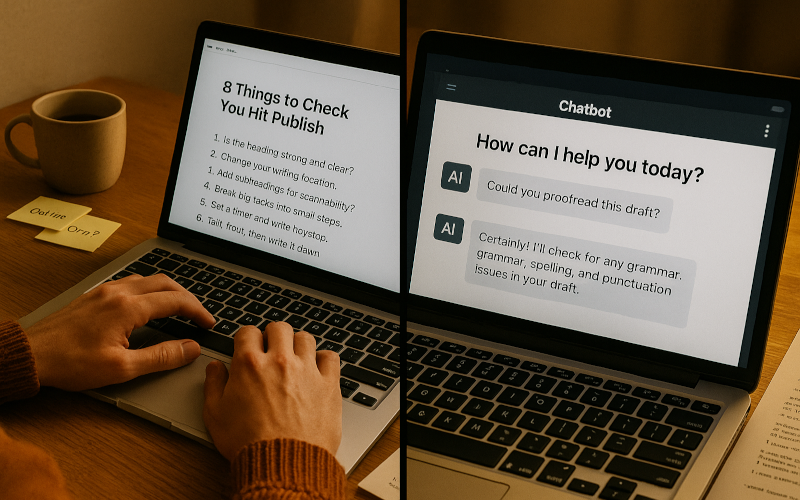Heads up: This post may have affiliate links. As an Amazon Associate, I earn from qualifying purchases.

8 Reasons the Future of Writing Needs AI + Humans
In the last few years, artificial intelligence has leapt out of sci-fi novels and landed right in our Google Docs. Writing assistants, chatbots, content generators, they're everywhere. If you’re a writer, it’s hard not to ask: Is AI here to replace me?
Let’s clear the air.
The future of writing isn’t about humans vs. AI. It’s about humans + AI.
Think of it like the invention of the calculator. Did it make mathematicians obsolete? Nope. It made them faster, more precise, and better equipped to solve bigger problems. The same is true for writing. AI isn’t the enemy, it’s a collaborator. And when paired with a human mind and heart, it can elevate content in ways we’ve never seen before.
Here are eight powerful reasons why the future of writing needs both AI and humans working together.
1. Humans Provide Creativity
Let’s start with what AI can’t do: original creativity.
Sure, AI can remix existing ideas. It can follow patterns, generate outlines, and reword content. But true creative thinking, the kind that births a new metaphor, a unique voice, or an unexpected twist comes from human minds.
Writers invent. They imagine. They pull insights from lived experiences, emotions, cultural memory, and even gut instinct. AI can assist, but it can’t originate soul-stirring creativity on its own.
So while AI might suggest a headline, only you can write the one that gives someone goosebumps.
2. AI Saves Time on Drafts
Now for what AI can do and does well.
Drafting. Rewriting. Summarizing. Formatting. Organizing. If you’ve ever stared at a blank screen for 45 minutes wondering how to start, AI can help you skip that pain.
Instead of wrestling with the first sentence, prompt an AI tool for an opening. Ask it to outline your article. Let it offer a few headline options.
This doesn’t take away your voice. It saves you time, so you can spend more of it refining your message and deepening your impact.
AI doesn’t have to write for you, it can write with you.
3. Humans Tell Stories With Heart
Every great piece of writing whether a novel, blog post, or social caption has one thing in common: emotion.
Stories stick when they make people feel something. That laugh in the second paragraph? That gut-punch line in the last? Those don’t come from algorithms. They come from human experience.
You know your audience. You understand what moves them, what frustrates them, what makes them lean in. AI doesn’t. It can mirror emotion, but it can’t genuinely feel.
The future of writing needs humans who know how to tell stories that breathe, bleed, and belong. Without heart, content is just noise.
4. AI Can Spot Grammar and Structure
Editing your own writing is like trying to find your reflection in a foggy mirror, you miss things. A lot of things.
This is where AI truly shines. Tools like Grammarly, Hemingway, and ChatGPT can catch:
-
Run-on sentences
-
Passive voice
-
Spelling slips
-
Clunky phrasing
-
Awkward transitions
It’s like having a grammar-savvy friend who never gets tired or annoyed.
Let AI do a first pass. Let it suggest improvements to your structure. But always follow up with your own human judgment. You know when a sentence sounds right, even if it’s not technically perfect.
5. Humans Add Context and Nuance
AI doesn’t know why something matters. It doesn’t understand sarcasm, double meanings, subtle shifts in tone, or the cultural weight of a phrase. You do.
As a human, you bring:
-
Context from current events
-
Sensitivity to tone
-
Cultural relevance
-
Empathy and discretion
For example, AI might suggest the word “cheap.” You might know that “affordable” feels better to your audience. That’s nuance and it matters more than you think.
Humans know the difference between what’s correct and what’s appropriate. That makes your role irreplaceable.
6. AI Can Analyze and Summarize Data
Have you ever tried turning a 60-page PDF into a single paragraph? It’s about as fun as alphabetizing rice.
AI can help by:
-
Summarizing research papers
-
Creating digestible bullet points from transcripts
-
Comparing statistics
-
Translating complex jargon into plain language
This doesn’t just save time, it enhances accuracy and accessibility. Writers can spend less time decoding and more time communicating.
Let AI chew on the data, and you serve the story.
7. Humans Know Culture and Emotion
Language doesn’t exist in a vacuum. It lives inside culture, and culture changes fast.
Humans understand:
-
Inside jokes
-
Trending slang
-
Taboo topics
-
What feels “off” even if it sounds right
AI doesn’t scroll Instagram or cry during Pixar movies. It hasn’t lived through awkward high school dances, heartbreak, or raising a toddler. You have.
That lived experience gives your writing depth, timing, and empathy. Without it, even the best AI-generated copy can feel a little… plastic.
When you add the human layer, the writing resonates.
8. AI + Humans Together = Best Results
AI is fast. Humans are thoughtful. AI is data-driven. Humans are heart-driven.
Put those strengths together, and you’ve got a content dream team.
Here’s what it can look like:
-
AI drafts the structure, you add the flavor
-
AI checks the grammar, you decide the tone
-
AI suggests topics, you know what matters most
You don’t have to choose one or the other. You can blend both into your process:
-
Faster research
-
Smarter brainstorming
-
Sharper editing
-
Deeper storytelling
It’s not about replacing writers. It’s about elevating writers.
It’s Not a Competition. It’s a Collaboration.
AI is not here to take your job. It’s here to take the boring parts of your job and make them easier. But it still needs you, your insight, your personality, your perspective.
The future of writing isn’t robotic or soulless. It’s a fusion. Writers who embrace AI as a creative sidekick not a crutch will unlock new levels of productivity and creativity.
So don’t fear the future. Shape it.
Because the best stories will always come from the people bold enough to tell them and wise enough to get a little help when they need it.
